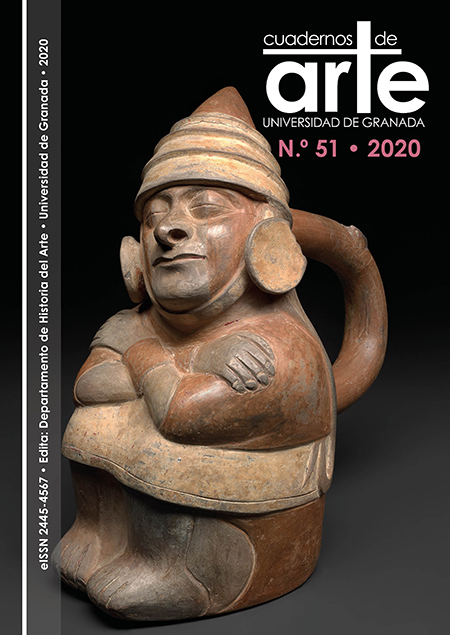Expresionismo, romanticismo y siglo XX: Das cabinet des Dr. Caligari en el Grand Guignol
DOI:
https://doi.org/10.30827/caug.v51i0.16028Palabras clave:
Teatro, Francia, terror, expresionismo, cine, Grand Guignol, Robert Wiene, Carl Mayer, Hans Janowitz, André de Lorde, Henri BaucheResumen
El Grand Guignol du Paris fue una compañía teatral que desarrolló su actividad entre 1897 y 1962. Principalmente subía a escena obras de teatro breve del género de terror exacerbado, extremadamente violento y explícito. El período de mayor éxito de esta compañía tuvo lugar en el primer tercio del siglo XX y, más concretamente, en el período entre las dos guerras mundiales. Este período coincide con el surgimiento y desarrollo de las artes de vanguardia. En este trabajo relacionamos el Grand Guignol con el arte expresionista, usando para ello una pieza clave del mismo, la película Das cabinet des Dr. Caligari, que fue llevada a escena por el Grand Guignol en 1925: Le Cabinet du Docteur Caligari, de André de Lorde y Henri Bauche. Analizamos las diferencias y similitudes entre la película y la pieza teatral en orden a determinar de qué manera el arte expresionista fue asimilado por la escena francesa.
Descargas
Citas
Breton, André. (1928). Nadja. París, Francia. Gallimard.
Buñuel, Luis. (2018). Mi último suspiro. Barcelono, España. Penguin Random House Grupo Editorial.
Gordon, Mel. (1997). The Grand Guignol. Theatre of fear and terror. New York, EE.UU. Da Capo.
Gubern, Román. (1989). Historia del cine. Barcelona, España. Lumen.
Hand, Richard J., y Wilson, Michael. (2013). Grand-Guignol. The French theatre of horror. Exeter, Reino Unido. University of Exeter Press.
Hunter, Jack. (2011). Chapel of gore and psychosis; The Grand Guignol Theatre. Hove, EE.UU. Creation Books.
Moix, Terenci. (1996). La gran historia del cine. Madrid, España. Prensa Española.
O’Leary, Sean J. (2005). The relationship between le theater du Grand Guignol and the cinema 1897-1962. Nueva Jersey, Estados Unidos. Rowan University.
Pierron, Agnès (1995). Le Grand guignol: Le théâtre des peurs de la Belle Époque. Paris, Francia. Robert Laffont, S.A.
Pierron, Agnès (2002). Les nuits blanches du Grand-Guignol. París, Francia. Seuil
Rivière, François y Wittkop, Gabrielle. (1979). Grand Guignol. París, Francia: Henri Veyrier.
Robinson, David. (1997). Das Cabinet Des Dr. Caligari. Londres, Gran Bretaña: British Film Institute.
Chenneviere, Georges. (23 de marzo de 1922). Le Cinéma. L’Humanité: journal socialiste quotidien, p. 2.
Deák, Frantisec. (marzo de 1974). Théâtre du Grand Guignol. The Drama Review, volumen 18, número 1, pp 35-43.
Gignoux, Régis. (6 de diciembre de 1925). Le nouveau spectacle au Théâtre du Grand-Guignol. Comoedia, p. 2.
Lorde, André de. (15 de julio de 1927). Le Cabinet du Doctor Caligari. La Nouvelle Revue, número 359, pp. 81-180.
Sánchez-Biosca, Vicente. (2004). El gabinete del doctor Caligari y los destinos del filme expresionista. Cine y vanguardias artísticas: conflictos, encuentros, fronteras, pp. 35-58.
Descargas
Publicado
Cómo citar
Número
Sección
Licencia
Los autores que publican en esta revista están de acuerdo con los siguientes términos:- Los autores conservan los derechos de autor y garantizan a la revista el derecho de ser la primera publicación del trabajo al igual que ser licenciado bajo una licencia Creative Commons que permite a otros compartir el trabajo con un reconocimiento de la autoría del trabajo y la cita de la fuente original, con un uso no comercial y siempre que no se hagan obras derivadas.
- Los autores pueden establecer por separado acuerdos adicionales para la distribución no exclusiva de la versión de la obra publicada en la revista (por ejemplo, situarlo en un repositorio institucional o publicarlo en un libro), con un reconocimiento de su publicación inicial en esta revista.
- Se permite y se anima a los autores a difundir sus trabajos electrónicamente (por ejemplo, en repositorios institucionales o en su propio sitio web) antes y durante el proceso de envío, ya que puede dar lugar a intercambios productivos, así como a una citación más temprana y mayor de los trabajos publicados (Véase The Effect of Open Access) (en inglés).






 ISSN-e: 2445-4567
ISSN-e: 2445-4567








